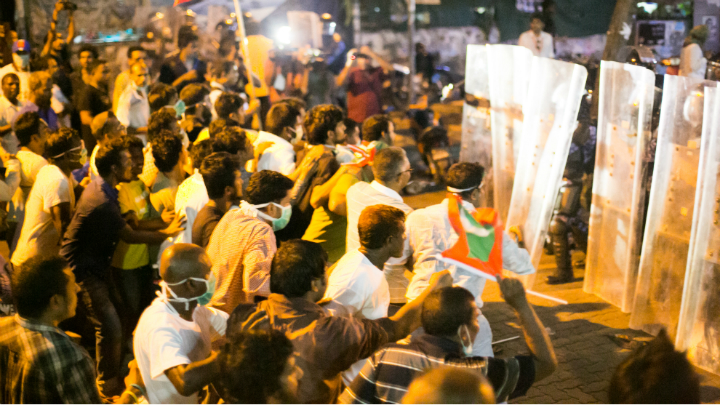The Gemanafushi Stoning Ruling

by H Abdulghafoor
It seemed like a blip in media time.
However, the court ruling to stone a woman to death for adultery issued by a magistrate in the Maldivian island of Gemanafushi in Gaaf Alif Atoll cannot be forgotten simply because it was revoked the same day by the benevolence of the Supreme Court.
Around sunset on Sunday 18 October 2015, the horrific news broke. By midnight the same day, the swift intervention undermining the ruling by the highest court in the land made the shocking news seem like a particularly bad rumour. It is of course, not a bad rumour – it is a very real travesty of justice or what is otherwise referred in social media circles as #MvInjustice. A common concept well understood by the Maldivian public.
The Gemanafushi Stoning Ruling is in fact a social lightning flash that happened inside a political hurricane.
The thunder will take time to rumble into earshot.
Its reverberations will be felt far into the future.
The Maldives has had a history of brutality and savagery within its criminal “justice” system. However, as a member of the United Nations, the country has acceded to the International Bill of Human Rights which gives it a strong veneer of respectability among the family of nations. The Maldives is also party to most of the core UN human rights conventions including the Convention Against Torture and Other Cruel, Inhuman or Degrading Treatment or Punishment (CAT, since 2004) and the Convention on the Elimination of All Forms of Discrimination Against Women (CEDAW, since 1993). The country is also party to the Optional Protocols to both these Conventions. This year, the Maldives celebrates its 50th year as a member of the UN. In fact, the Maldives has performed so well in its engagement with the UN human rights system that the country became a member of the UN Human Rights Council in 2010. It remains a member, having been re-elected in 2014. The Ministry of Foreign Affairs jubilantly embraced the prestige of this membership declaring that
The Maldives stood for the voiceless in the international society; for the issues that affect the very fundamental values of human rights yet, hardly get a mention in global human rights debate; and it stood for helping the vulnerable and emerging democracies to cultivate the values of human rights in their societies.
Evidently, the country’s intentions to advocate for the voiceless and vulnerable are honourable.
The concerned and thoughtful public in the country immediately began to ponder the gravity of the unprecedented development that took place in Gemanafushi. What has this country become? Where are we headed? Stoning is an atrocity that we hear of happening in “other” “backward” and “uncivilised” countries with the greatest disregard to the human rights of citizens. It is something witnessed only on film, told in stories about foreign lands. What kind of judge delivers such a barbaric ruling, to initiate a practice that has never been seen in the Maldives – a country with a people proud of its long 800 year Islamic history, unfailing in their devotion to Islam as a collective? How able is this magistrate to issue such a ruling? How sane is he? Is he in fact, fit for responsible public office? Such questions would roll incessantly in the minds of those who think. The Gemanafushi Stoning Ruling is a seismic shock to the body politic.
The practice of stoning conjures up the kind of barbarism the Hindu cultural practice of Sati or widow burning does, which took place in India historically. Linda Heaphy in her researched article on Sati wrote that
Sati was regarded as a barbaric practice by the Islamic rulers of the Mogul period, and many tried to halt the custom with laws and edicts banning the practice.
The fact that Sati was deemed unacceptable by the Islamic Mughal Emperors of India during the 16th and 17th centuries indicates the rejection of that horrific traditional practice by Muslims of the Asia region, even at that time in history. Sati was finally outlawed in 1827 by the Governor General of India “claiming it had no sound theological basis.”
Stoning is such a practice in Islamic cultural history. It is a disputed and debated topic by Muslim scholars, having no consensus. Although still practised in ultraconservative societies such as Iran, Afghanistan and Saudi Arabia, it is banned by other Muslim nations such as Malaysia, Indonesia, Tunisia and Algeria. Stoning is rejected as barbaric and inhuman by progressive thinkers and human rights advocates around the world, including in those countries where it is practised.
The Gemanafushi Stoning Ruling is especially problematic because the Maldives has never considered this practice as a valid form of punishment in its long Islamic history. In that ruling, the punishment was meted out to a mother of five children who allegedly “confessed” to having a child out of wedlock. In the Maldives, the vast majority of adultery convictions and the customary punishment of public flogging are carried out against women. Available data shows that in 85% of cases, women are convicted for adultery as opposed to 15% men. In the Gemanafushi case, the complete absence of any reference to the involvement of a man in the conception of the child is telling, and unsurprising. Adultery allegations are just one area where women experience systemic discrimination.
According to Iranian scholar, Muslim feminist and Musawah advocate Ziba Mir-Hosseini,
Islamic sources of law are explained in many ways that allow for the discrimination of women. We often hear about stoning as punishment for adultery, or practices like female circumcision, but there are also laws that affect a woman’s right to education, employment opportunities, inheritance rights, dress and freedom to consent to a marriage. ….
There are women who might get stoned to death at any time, and we can’t help them right now, even though I know that stoning shouldn’t be part of Islamic law.
The campaign Violence Is Not Our Culture says that in the Islamic Penal Code of Iran, a single judge may rule “to his personal opinion instead of hard evidence” and “most stoning sentences … are issued not on the basis of testimony or confession but on the judge’s “knowledge” or “intuition”. In the Gemanafushi case, it is unclear whether the sentencing was based on the intuition of the magistrate, although a confession is alleged. However, the Supreme Court’s statement nullifying the ruling said that the sentencing was not conducted in line with judicial principles and procedures.
In the patriarchal society of the Maldives, it is evident that interpretations of Islam have been increasingly radicalised, undermining and solidifying ideologies that view women as subordinate to and placed at the service of men. An alarming development that helps to explain what is happening in the Maldives today is captured by the Maldivian Democracy Network’s (MDN) recent analysis of the Islamic curriculum in Maldivian schools. The study found that the Islam textbook for grades 8 to 12 (13 to 17 year age group) taught that the religious rulings on “unlawful sexual relationships” involved the following :
1 – The man who is married and has consummated his marriage shall be sentenced to death by stoning.
2 – The man who is unmarried shall be lashed 100 times and banished for a year.
3 – The slave’s punishment will be half of that of a freeman, therefore 50 lashes.
Besides endorsing execution by stoning as “Islamic”, the text implies the acceptability of slavery as normative in Islamic culture. The fact that the Maldives has signed international treaties which obligate the State to respect, promote, protect and fulfil the human rights of citizens and categorically reject practices that violate basic human rights – including capital punishment and slavery – do not feature in school textbooks. Instead, the narrative provided to school children in their grade 9 textbook informs them that
there is a propaganda effort by the West to elect adherents of ‘Western ideology’ … to policymaking and governing positions in Islamic communities.
The MDN study highlights the presence of xenophobia and intolerance towards other faith groups within the school textbooks, observing that “even Islamic sects other than Sunni Islam are categorically maligned under this curriculum”.
According to Violence is Not Our Culture, the global campaign to stop violence against women in the name of culture, stoning is not endorsed in the Qur’an.
… there is no mention of stoning in the Quran, and the practice is only implied in the Hadith in the context of the Prophet Muhammad’s dealing with Jewish Law.
In fact, the practice of stoning is considered to have a history in Greek and Jewish culture, among others. It is also considered by some sources to be a pre-Islamic Arab cultural practice. The fact that a practice historically attributed to Judaism is being accepted as “Islamic” is a curious irony in the Maldives context where antisemitism is palpable among conservative segments of the population.
The judicial system in the Maldives has been under great scrutiny and study over the last decade. According to the August 2015 mission report to the Maldives by the International Commission of Jurists (ICJ), from 2003, the education of judges involved a “part-time one-year certificate course in “Justice Studies””. Further, “many of the sitting judges … had little or no formal legal education.” To address this, many sitting judges are currently undertaking higher education courses, as is the case with the Gemanafushi magistrate who issued the stoning ruling. The appropriately entitled ICJ report “Justice Adrift : Rule of Law and Political Crisis in the Maldives” observed further systemic issues, as described in this extract.
A number of recent criminal proceedings have displayed a pattern of violations of due process and fair trial rights under the ICCPR and the Maldives Constitution. The mission observed that the Maldives has no procedural laws such as a criminal procedure code, evidence code or codes of conduct for judges or prosecutors. The mission noted that the absence of these basic legal frameworks for criminal proceedings have helped enable courts and prosecutors to conduct criminal proceedings in an often arbitrary or biased manner, without regard for internationally recognised procedural safeguards and other fair trial guarantees.
The Gemanafushi Stoning Ruling is an indicator of the convulsions Maldivian society is experiencing in its current fragile state – socially, culturally and politically. It is an indicator of grievous political irresponsibility, the absence of just intentions toward the public good and toward good governance. It is indicative of an approaching tipping point resulting from years of neglect of the education system and curricula. Furthermore, it is the consequence of the unwillingness of key stakeholders to establish a functional justice system based on the provisions of the 2008 Constitution. It is above all a critical indicator of the loss of identity, common values of humanity, connection to community and cultural coherence. The combined effect of intolerance, radicalisation and weak governance produces a toxic social result, which is the lightning flash witnessed in the Gemanafushi Stoning Ruling. It must be rejected wholeheartedly and vocally by the Maldivian public, to reclaim their identity as a peaceful and justice loving people.

